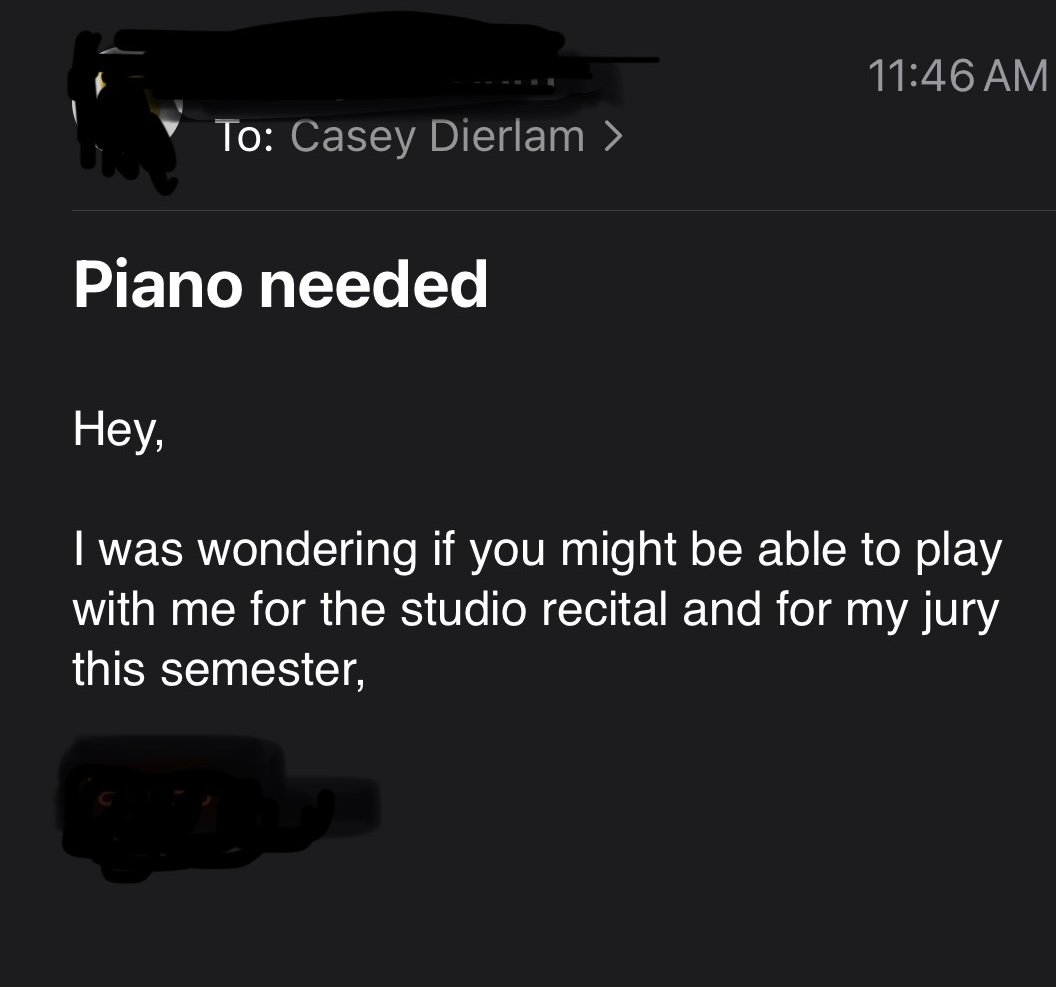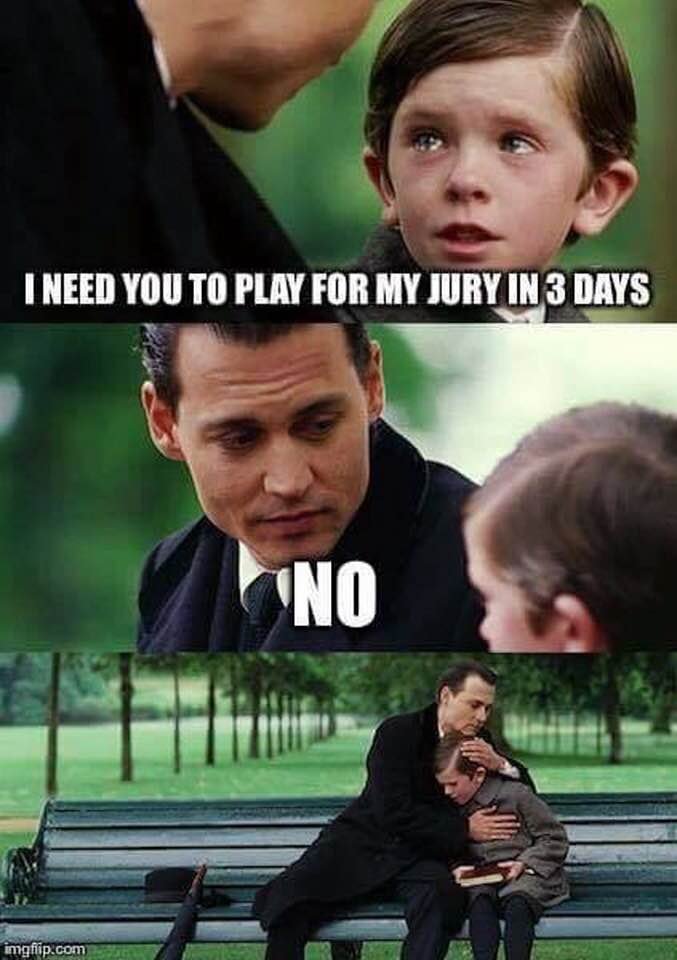So . . . you need a pianist?
After requests to address this topic from SEVERAL friends and colleagues teaching at universities throughout the US, I’ve decided to post an informational guide on how to contact and procure a pianist – something I hope will be helpful for younger students. Based on numerous personal experiences, it is clear that many, MANY, (MANY!!!) students are unaware of how to to email a “stranger”, to ask for services, to give appropriate information, and to simultaneously express common courtesy – something that is surprisingly still valued by many of us.
I receive messages ALL the time with so many fundamental problems, I don’t even know where to begin with my response. Honestly, when I’m swamped with work, practice, travel, among other obligations – I’m sure there are times when I can’t find the bandwidth to respond. Take for instance this request (a real email from my files) from a student I have never met or worked with previously:
While I’m certainly a fan of brevity – you can almost imagine my reaction when reading this. Question marks were flying from my head, and I’m sure the facial expressions I made were a sight to behold. Somewhat akin to this . . .
An inappropriate, but funny, response from me might be “Dude! Sure, I’d love to!!!”
But . . . that’s probably not going to work out very well for the student. Though he seems just clueless enough to be thrilled with the response. Little does he know . . .
My head was racing - What instrument does he play? When is the studio recital? When is the jury? What piece does he plan to perform? When might he like to rehearse? Does he need me to come to a lesson with his professor? Does he have knowledge of whether he would need to pay for a pianist, or does he assume I would play for these things out of the goodness of my heart? Has he met me before or is this his first time contacting me? The questions are almost endless.
Sadly (for me!!), in this case – I DID respond, and asked MANY of those questions, only to get a reply that included an answer to one (ONE!!!) of my questions . . . .
And because I do not have time to continue emailing back and forth gleaning bits of info from each response, trying to piece it all together – communication ended at that point. Frankly, if you can’t compose a thoughtful email with all the necessary components, I have low hopes for your ability to put together a Hindemith sonata with a pianist. This isn’t me trying to be mean – it’s simply the reality I’ve experienced over the past 25 years.
So – if you want to make a good impression on a pianist, and possibly find one you will be able to work with long term – let’s discuss some important facets of your communication!!
1. GREETING
Perhaps something other than “Hey” would be a nice way to start your email – especially if you’ve never met the person before. In this scenario, try options like:
“Hi, my name is ______.”
Or let’s be bold and really let loose . . .
“Hello, my name is ____, and I’m a junior in the trumpet studio with Prof. _____.”
Already, you’ve given some very important and basic information that a pianist might want to know. I’ve literally received emails from students I don’t know, who failed to mention that they live 2 hours away and attend a different school from where I normally work.
If you DO know the person, or have worked with them before, try a friendly greeting, such as
“Hi ____, I hope you had a great summer!!” or “Hi! I hope you are doing well.” and proceed from there.
2. WHY ARE YOU WRITING THIS PIANIST?
“I was given your name by ______ as someone who might be willing to work with me on some upcoming projects.”
Or even better – because who doesn’t love a nice compliment every now and then – “I heard you on a recital I attended last week, and I would love the chance to be able to work with you!”
3. WHAT DO YOU NEED?
This is really the KEY element of your email. And where you should be thorough with your request and all information pertaining to your request.
***WHAT do you need a pianist for? – This includes both the event, AND the piece(s)!!
(Brownie points if you include a pdf of the music, in case they aren’t familiar with it.)
***WHEN and WHERE do you need the pianist? – Date, time, location of event
This is also where some thinking ahead and planning can be beneficial for everyone involved. What are the other needs you might be asking of the pianist in preparation for the performance? As you know – performances don’t just happen on their own - despite our wishful thinking.
Does your professor expect you to bring a pianist to a lesson prior to a jury? Do you plan to set up a dress rehearsal for your recital? And if so, how far in advance? When is your lesson day/time? What are options for the potential dress rehearsal?
Do you have an idea of how many rehearsals you might want to have? One rehearsal plus a lesson? If you do, then you can even consider asking about the possibility of rehearsing during a specific week and coming to a lesson during the following week.
Any pianist worth YOUR time to work with, probably has a full schedule. Assume they have a full schedule – and address your scheduling needs head on!
And while we are on schedules and planning ahead – don’t email a pianist one week before your recital or jury and ask if they can play with you. If it took you 4 months to learn your piece, why do you assume a pianist only needs 4 days?
4. DO YOU NEED TO PAY YOUR PIANIST?
If you are unsure about your university’s system for providing a pianist for student performances, the first thing you should do is talk to your professor. Find out if you are being provided with a pianist for your jury, your recital, the concerto competition, etc.
If you aren’t – then you’re going to be hiring someone. We pianists love playing the piano, we love meeting you guys, we really love it (and you!) when you are prepared and play well – but ultimately this is still OUR JOB. We love music. We love you. But we love buying groceries and feeding our cute pets even more.
So – it might be prudent to say in the email “I’m wondering what your fee would be for taking on this project” or ask “What is your rate for a recital (or jury) and rehearsals/lessons?” Something that shows you are aware you will need to pay, and that you will plan accordingly.
5. RESPOND
Please, please, PLEASE respond to the pianist after they write you back. If you’ve asked them about a recital date and they said they could do it – they are probably holding that date for you in their calendar. If you don’t actually respond to confirm you received their email and everything is a go, it’s like . . . .
If you changed your mind about the recital or the repertoire or even the need for a pianist – please just let us know. When we take the time to write you back, it’s nice to get a confirmation, one way or the other. It’s even possible the pianist is WAITING to hear back from you before they commit to something else.
Please, just give the courtesy of a response. A kind, honest, and timely response.
So – here’s a few examples of great emails.
Let me tell you how much I LOVE!!! these kinds of students. Students who are polite, who plan ahead, who know exactly what they need and when they need it, who respect my time and my limited availability and ask so far in advance we literally have their rehearsals/lessons/recording dates/juries/recitals for the entire semester all planned out in August. It’s wonderful!!! I will do anything for these students – because from the first email I see that they are mature, serious, invested, respectful, organized, and simply on top of their game. And from that knowledge comes an expectation that they will be great musicians as well. I KNOW that they will have their part learned and follow through on their projects. And when something comes up and these students find themselves in a bind or needing a pianist for something last minute – they are the ones I will bend over backwards to accommodate.
Let’s be honest – not everyone can be *THAT* on top of things. But I still heartily believe that with the right email, you CAN set the stage for an efficient, enjoyable, and successful collaborative relationship!
Here are a few general timeline considerations for requesting and working with a pianist. If you know your music is incredibly difficult, or not standard for the instrument, I recommend beginning everything sooner.
STUDENT RECITALS:
Request a pianist at the beginning of the semester for any recital taking place during that semester. If you want to work with a specific pianist, contact them and find out their availability BEFORE you set your recital date.
Have all music to the pianist no less than 8 weeks before recital.
Do at least a preliminary rehearsal/read-through of music 6 weeks before recital. This will also answer questions you both have about how difficult the music will be to learn, put together, and will help you plan how many rehearsals you might need.
Have all music ready for a performance at least 2 weeks prior to the performance date.
JURIES
Contact pianist no later than Nov. 1st for December juries (earlier is always okay!) or March 15th for May juries. Essentially think a minimum of 6 weeks ahead.
Send them the music within a week after confirmation that they will play for your jury.
Have a first rehearsal at least 3 weeks before your jury, so the option of having a pianist in your lesson the week or two before juries is there.













